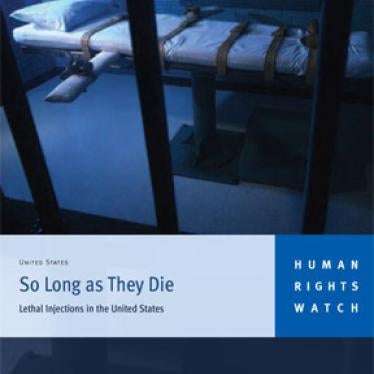(Washington, DC) – Connecticut is poised to become the fifth US state in five years to abolish capital punishment, a clear sign that the momentum against the death penalty is gaining force, Human Rights Watch said today.
The Connecticut House of Representatives on April 11, 2012, voted to repeal the death penalty, following a similar vote, on April 5, by the state Senate. The bill now goes to Governor Dan Malloy, who released a statement after the House vote saying he would sign the bill into law.
“Death as government-sanctioned punishment is not only inherently cruel, it is becoming more and more unusual,” said Antonio Ginatta, US advocacy director at Human Rights Watch. “The Connecticut legislature is putting the state on the right side of history.”
Since 2007, the death penalty has been eliminated in New Jersey, New York, New Mexico, and Illinois. After Connecticut joins them, 17 US states will have rejected capital punishment. Thirteen states that have the penalty on the books have not used it for at least five years. Challenges to the death penalty are also being mounted in California and Maryland.
Connecticut’s decision to repeal the death penalty is not retroactive. The 11 people on the state’s death row will still remain eligible for capital punishment. The failure to make the change retroactive is contrary to the International Covenant on Civil and Political Rights. Article 15 states that if a law reduces a criminal penalty, all offenders should benefit from such a reduction, even those who committed their offense before the reduction. However, when the US ratified the treaty in 1992, it included a reservation that it would not adhere to this provision, stating that, “US law generally applies to an offender the penalty in force at the time the offence was committed.”
Human Rights Watch opposes capital punishment in all cases because the inherent dignity of the person cannot be squared with the death penalty, a form of punishment unique in its cruelty and finality. It is a punishment inevitably and universally plagued with arbitrariness, prejudice, and error. The death penalty is widely rejected by rights-respecting democracies around the world, including all 47 member countries of the Council of Europe.
“Connecticut is well on its way to making the death penalty a thing of the past,” Ginatta said. “The state’s next step should be to make its repeal retroactive.”







